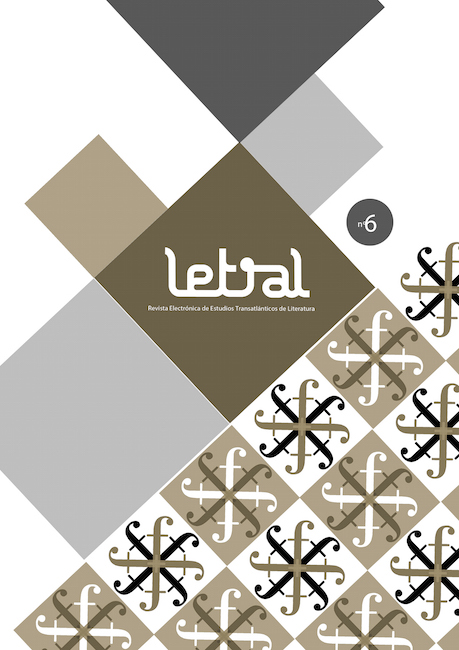Junot Díaz y el canon, un “canibalismo líquido”
DOI:
https://doi.org/10.30827/rl.v0i6.3647Palabras clave:
Junot Díaz, Literatura Dominicano-Americana, Canon, IntertextualidadResumen
El propósito de este trabajo consiste en situar la obra de Junot Díaz, The Brief Wondrous Life of Oscar Wao, dentro de la República mundial de las letras. Se analizará su posición respecto al canon, en sus diferentes acepciones. Mediante algunos ejemplos se ilustrará el modo cambiante y no domesticable por parte de Díaz de posicionarse frente a múltiples cánones. Díaz va incorporando diálogos con un continuo fluido de textos y conceptos que aumentan la fragmentación, el dinamismo y la dispersión según múltiples ejes (este/oeste; norte/sur; intracaribeño). Por eso, el escritor practica lo que se podría tildar de “canibalismo líquido”.Descargas
Citas
Bauman, Zygmunt. Liquid Life. Cambridge: Polity Press, 2005.
Bautista, Daniel. “In and out the mainstream. Dominican-American Identity in How to date a whitegirl, browngirl, blackgirl or halfie”. Romance Notes. 49.1 (2009): 81-90.
Bourdieu, Pierre. Les règles de l`art. Paris: Seuil, 1998.
Céspedes, Diógenes y Silvio Torres-Saillant. “Fiction is the Poor Man´s Cinema. An Interview with Junot Díaz”. Callaloo. 23.3 (2000): 892-907.
Danticat, Edwidge. “Junot Díaz”. BOMB Magazine. 101 (otoño de 2007). 16 nov. 2008. http://www.bombsite.com/issues/101/articles/2948.
De Maeseneer, Rita. “The Brief Wondrous Life of Oscar Wao (2007) de Junot Díaz: una reflexión sobre autoritarismos”, “Pasaporte latino: viaje, cultura e identidad en la literatura hispana en los Estados Unidos”. La Nueva Literatura Hispánica. 2011: 243-262.
—. Seis ensayos sobre narrativa dominicana contemporánea. Santo Domingo: Publicaciones del Banco Central, 2011.
Díaz, Junot. The Brief Wondrous Life of Oscar Wao. New York: Riverhead Books, 2007.
—. La maravillosa vida breve de Óscar Wao. Barcelona: Random House Mondadori, 2008.
Fernández Porta, Eloy. Afterpop. La literature de la implosión mediática. Córdoba: Berenica, 2007.
Fernández Retamar, Roberto. Todo Calibán. La Habana: Editorial Letras Cubanas, 2000.
Garland Mahler, Anne. “The Writer as Superhero: Fighting the Colonial Curse in Junot Díaz´s The Brief Wondrous Life of Oscar Wao”. Journal of Latin American Cultural Studies. 19.2: 119-40.
Guillory, John. Cultural Capital: The Problem of Literary Canon Formation. Chicago & London: The University of Chicago Press, 1993.
Hardin, James (ed.). Reflection and Action. Essays on the Bildungsroman. Columbia, SC: University of South Carolina Press, 1991.
Kermode, Frank. “El control institucional de la interpretación”. El canon literario. Enric Sullà editor. Madrid: Arco/Libros (1998): 91-112.
Lago, Eduardo. “Estados Unidos tiene pesadillas en español”. El País. 1 de mayo 2008. http://www.elpais.com/articulo/cultura/EE/UU/tiene/pesadillas/espanol/elpepicul/20080501elpepicul_1/Tes.
Pérez Cino, Waldo. “A vueltas con el canon”. Iberoamericana. 22 (2006): 123-42.
Pollack, Sarah. “Latin America Translated (Again): Roberto Bolaño´s The Savage detectives in the United States”. Comparative Literature. 61:3 (2009): 346-65.
Pozuelo Yvancos, José María y Aradra Sánchez, Rosa María. Teoría del canon y literatura española. Madrid: Cátedra, 2000.
Walcott, Derek. The Star-Apple Kingdom. London: Jonathan.
Descargas
Publicado
Cómo citar
Número
Sección
Licencia
Revista Letral es una publicación de acceso abierto e inmediato totalmente gratuita, tanto para quien lee como para quien publica. Los autores y las autoras no pagan ningún tipo de tasa por el proceso editorial de sus artículos. Permitimos la lectura, descarga, copia, distribución, impresión, búsqueda, enlace o reutilización con fines no comerciales de todos los trabajos publicados, siempre que se citen la autoría, la revista y el órgano editor. Recomendamos encarecidamente la difusión de los artículos en redes sociales (Facebook, Twitter, LinkedIn, etc.) y científicas (ResearchGate, Academia.edu, etc.), repositorios institucionales universitarios y otros repositorios públicos, blogs y webs personales o institucionales, Google Scholar, ORCID, ResearchID, ScopusID, etc. En cualquier caso, la propiedad intelectual de los artículos y los posibles derechos económicos derivados de ellos son exclusivamente de sus autores.














